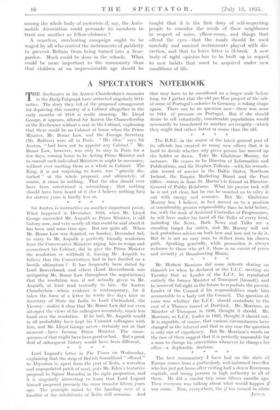Sir Austen is instructive on another important point. What happened
in December, 1916, when Mr. Lloyd George succeeded Mr: Asquith as Prime Minister, is old history now, and very nearly all that could be said about it • has been said some time ago. But not quite all. When, Mr. Bonar Law was deputed, on Sunday, December 3rd, to carry to Mr. Asquith a perfectly friendly resolution from the Conservative Ministers urging him to resign and reconstruct his Cabinet, did he give the Prime Minister the resolution or withhold it, leaving Mr. Asquith to believe that the Conservatives had in fact decided on a hostile ultimatum ? It has frequently been stated by Lord Beaverbrook and others (Lord Beaverbrook was instigating Mr. Bonar Law throughout the negotiations). that the resolution was, if not, actually given to Mr.. Asquith, at least read textually to him. Sir Austen Chamberlain—whose evidence is contemporary, for it takes the form of a letter he wrote five clays later as Secretary of State for .India to Lord Chelmsford, the Viceroy—makes it clear that Mr. Bonar Law did not even.. interpret the views of his colleagues accurately, much less hand over the resolution. If he had, Mr. Asquith- would, in all probability have kept his Unionist colleagues with him, and Mr. Lloyd George never—dertainly not at that moment—have . become Prime Minister. The eonse- , quences of that might have been good or bad. But a great . deal of subsequent history would have been different.










































 Previous page
Previous page